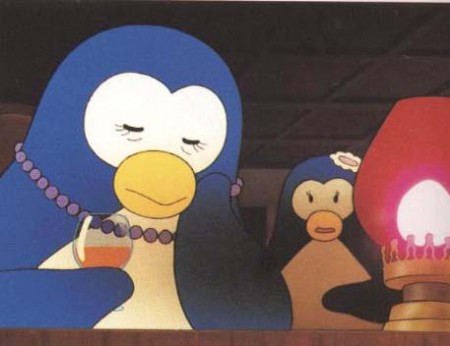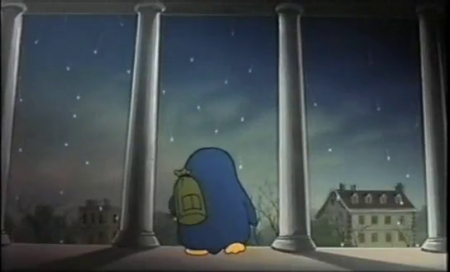Remembering Penguins Memories
In 1983 the Suntory beverage company launched a series of animated TV commercials to promote its new canned beer. The unique, memorable spots evoked melancholy, nostalgic sequences from the era of classic Hollywood, with humans replaced by squat, stylized anime penguins that resembled Sanrio mascots. The ad campaign proved popular enough that the concept was expanded into the 1985 original feature film Penguin’s Memory ~Shiawase Monogatari~. The movie and its originating ad campaign has remained a Japanese cult classic, referred to as recently as 2010’s Japanese TV commercial for Suntory’s Silky Black canned coffee. But the movie hasn’t been seen widely outside of Japan. The movie’s obscurity is unfortunate, as the picture provides another example of the anime golden era’s penchant for uniquely experimental, creative, and memorable productions. Penguin’s Memory is a striking film inconceivable in today’s anime production environment.
Mike Davis is a battle-weary soldier sunk in the midst of the Vietnam-esque Delta War. He witnesses war atrocities, comrades killed, and is himself shot, leading to him being shipped back home to his small town, his loving family, and a numb sense of quiet desperation. Although the film never explicates Mike’s thoughts, his actions clearly reveal a haunted, alienated man who feels appalled by war but out of place and useless in peaceful civilian society. When he ventures out in search of his purpose, he meets and slowly falls in love with aspiring vocalist Jill, and comes to realize that the sacrifices he made in war were just the beginning of the losses and hardships he’s destined to face. Mike is confronted by Jill’s betrothed. When the promising doctor realistically asks if Mike can provide for Jill’s future and happiness, Mike gives her up, for her own benefit. Jill, however, decides to choose love over her burgeoning career, arousing the ire of her rapacious manager, who threatens both Mike and Jill, forcing Mike to resort to violence.
The 100 minute long feature includes only two action scenes, and both of them are harrowing, frightening scenes designed to convey the terror, desperation, and ugliness of violence. Rather than sensationalize or turn the movie into a rousing adventure, the film’s two action scenes underscore the entire movie’s melancholic, existential, tragic drama about happiness and love earned through emotional pain, suffering, and perseverance. The film doesn’t overtly present an anti-war stance; rather, it depicts the blunt, incongruous contrast between the mortal hell of the jungle and the happy, carefree peace of the homefront, far removed from the front lines of the war. Although the film is entirely populated by squat, pudgy penguins that would look at home in Hello Kitty’s neighborhood, the movie is anything but a children’s film. The movie is a methodically paced drama infused with melancholy sentimentality and loneliness, evoked through bluesy music, plenty of drinking, and numerous long, static shots with little or no background music, emphasizing how ultimately empty, hollow, and solitary the world really is. Particular scenes, for instance, Mike’s time hidden in a cave with his gravely injured platoon-mate Tom and Mike’s first date with Jill are animated with an impressive fluidity, and the entire movie is illustrated with atmospheric lighting that evokes a nostalgic, bittersweet classic.
The film is the type of anime that simply couldn’t get produced in today’s cutthroat environment of anime concerned with the bottom line, marketability, and merchandise potential. Penguin’s Memory is a subdued, somber film concerned with characters and relationships rather than sensationalism or action, and a film unafraid to court a sad ending rather than be a crowd-pleaser. Ironically, despite starring cute penguins, the tone, atmosphere, and pacing of the movie feel far more comparable to a tragic love story from the golden age of Hollywood starring Humphrey Bogart. Although arguably a bit too beholden to the style of the film’s it’s trying to pay homage to, the very fact that Penguin’s Memory is a film with such integrity and a film almost completely devoid of the sort of prankish, juvenile pandering typical of contemporary otaku or family oriented anime makes it a fascinating departure from the sort of anime that today’s otaku are used to.
Add a Comment
You must be logged in to post a comment.






Wow. This sounds completely and utterly fascinating. I’m shocked that I’ve never heard a thing about it, especially considering how much time I’ve personally invested into research and viewing of classic and forgotten anime titles. I actually did not have a WordPress account to post on the Animenation news blog (though I consistently come here and read this blog for my anime news) until moments ago, but literally made one just to thank you for this article and for bringing this seemingly incredible film to my attention. As a person with a real love and appreciation for the art of anime and some of the incredibly imaginative works of the “golden age” of anime, I’m happy you made this post to bring such a fascinating title to the attention of myself and, hopefully, other anime fans. This sounds truly unique and brilliant, and I will have to track this film down and see it for myself. Thanks again, John. Once again, articles like this, and your real love and appreciation for the art form, is why the Animenation News Blog is great. Thanks again, keep up the great work, and cheers. I’ll be checking out this film as soon as possible.
The flick is available in pieces on YouTube. It’s also mostly available in pieces on NicoNico. Inexplicably, on NicoNico part 3 out of 5 has been removed due to licensor request. The complte film, as one single file, is accessible on Veoh.
Not a chance it’ll be distributed